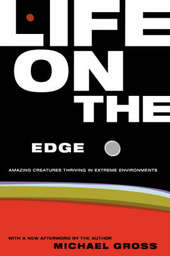
|
Life On The Edge
Paperback / softback
Main Details
| Title |
Life On The Edge
|
| Authors and Contributors |
By (author) Michael Gross
|
| Physical Properties |
| Format:Paperback / softback | | Pages:224 | | Dimensions(mm): Height 235,Width 152 |
|
| Category/Genre | Pets and the Natural World |
|---|
| ISBN/Barcode |
9780738204451
|
| Classifications | Dewey:578.4 |
|---|
| Audience | | Undergraduate | | Postgraduate, Research & Scholarly | | Professional & Vocational | | General | |
|---|
|
Publishing Details |
| Publisher |
INGRAM PUBLISHER SERVICES US
|
| Imprint |
Perseus Books
|
| Publication Date |
1 January 2001 |
| Publication Country |
United States
|
Description
A new and revealing examination of life on Earth-from the perspective of its hardiest inhabitants.. Can life exist in the Antarctic ice, in the deep subsurface, in dilute sulfuric acid, in hot springs-even on Mars? What degree of high or low temperature, pressure, or salt concentration can living cells tolerate? In recent years, scientists have discovered many single-cell creatures that exist in-in fact, are perfectly adapted to-extreme environments that were considered uninhabitable just one or two decades ago. In Life on the Edge , author Michael Gross explores how microorganisms adapt to their hostile environments and how they affect our current definition of the "normal" conditions for life. He also describes the vast implications of these extremophiles and other amazing creatures-from potential breakthroughs in medicine and biotechnology to the search for life elsewhere in the universe.
Author Biography
Dr. Michael Gross has studied various aspects of life under extreme conditions throughout his research career. He received his doctorate in physical biochemistry from the University of Regensburg, Germany. After seven years of research in protein biochemistry at the University of Oxford, he has recently switched to writing full time and is the author also of Travels to the Nanoworld.
Reviews"A fascinating introduction to the subject [of life in extreme environments]. Challenging in parts--but well worth the effort." New Scientist
|